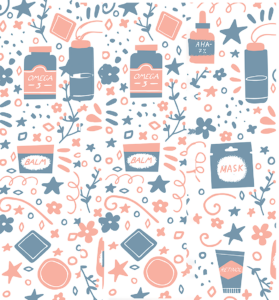 What Are Retinoids?
What Are Retinoids?
Retinoids are a class of chemical compounds derived from vitamin A, a vital nutrient for skin health. Retinoids come in various forms, such as retinol, retinaldehyde, and prescription-only tretinoin. These potent substances boast an impressive range of benefits for the skin and have been a staple in dermatology for decades.
How Do Retinoids Work?
Retinoids work by binding to specific receptors in the skin cells, prompting them to behave in a more youthful manner. They accelerate cell turnover, encouraging the shedding of old, dead skin cells and promoting the growth of new, healthy ones. Additionally, retinoids stimulate collagen production, a key protein responsible for skin’s elasticity, firmness, and overall youthful appearance.1,2 Benefits of retinoids include the following:
- Diminish wrinkles and fine lines. Retinoids can reduce the appearance of wrinkles and fine lines. Regular use can lead to smoother, more youthful-looking skin.1,2
- Fights acne. For those struggling with acne-prone skin, retinoids can be a game-changer. Retinoids act to normalize desquamation (exfoliation) by reducing keratinocyte production (the cells that produce keratin) and promoting differentiation. Topical retinoids also have anti-inflammatory properties, which helps clear acne lesions and prevent new ones from forming.3
- Improves skin texture. Uneven skin texture, roughness, and dullness can be significantly improved with the use of retinoids, leaving your skin with a smoother and more even-toned complexion.1,2
- Improves pigmentation disorders. Whether caused by sun damage or post-inflammatory responses, retinoids aid in reducing dark spots and hyperpigmentation, giving you a more even skin tone.4
- Boosts collagen production. Retinoids play a crucial role in boosting collagen production, which helps to maintain skin’s elasticity and firmness, reducing sagging and promoting a youthful appearance.1,2
Using Retinoids Safely
- Start slowly. When incorporating retinoids into your routine, start with a lower concentration to allow your skin to acclimate. Gradually increase the usage over time to reduce the risk of irritation.
- Nighttime application. Retinoids can increase skin sensitivity to the sun, so it’s best to apply them at night. Always wear sunscreen during the day to protect your skin from harmful UV rays.
- Avoid mixing with certain ingredients. Be cautious when combining retinoids with other active ingredients like AHAs (alpha hydroxy acids) and BHAs (beta hydroxy acids), as they may cause excessive dryness and irritation.
- Moisturize. To counteract any potential dryness or flakiness, use a gentle and hydrating moisturizer in your routine.
Bottom Line
Retinoids have earned their reputation as an indispensable ingredient in the world of skincare. From smoothing out wrinkles and fighting acne to improving skin texture and addressing pigmentation disorders, the benefits of retinoids are numerous. However, it’s important to use them responsibly by starting with a cautious approach and making sure to also use a good sunscreen and moisturizer.
Editor’s note: Consult with a dermatologist or skin care professional before incorporating retinoids into your skin care regimen.
Sources
1. Mukherjee S, Date A, Patravale V, et al. Retinoids in the treatment of skin aging: an overview of clinical efficacy and safety. Clin Interv Aging. 2006;1(4):327–348.
2. Darlenski R, Surber C, Fluhr JW. Topical retinoids in the management of photodamaged skin: from theory to evidence-based practical approach. Br J Dermatol. 2010;163(6):1157–1165.
3. Leyden J, Stein-Gold L, Weiss J. Why topical retinoids are mainstay of therapy for acne. Dermatol Ther (Heidelb). 2017;7(3):293-304.
4. Callender VD, Baldwin H, Cook-Bolden FE, et al. Effects of topical retinoids on acne and post-inflammatory hyperpigmentation in patients with skin of color: a clinical review and implications for practice. Am J Clin Dermatol. 2022 Jan;23(1):69–81.


 What Are Retinoids?
What Are Retinoids?

